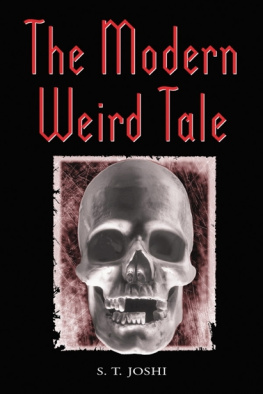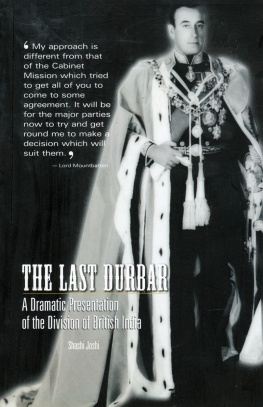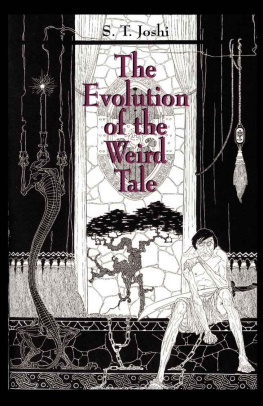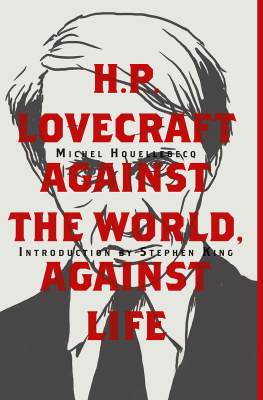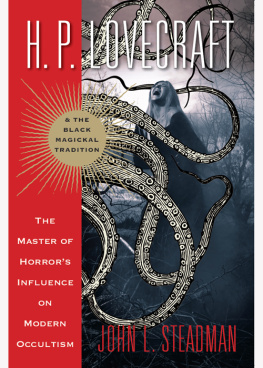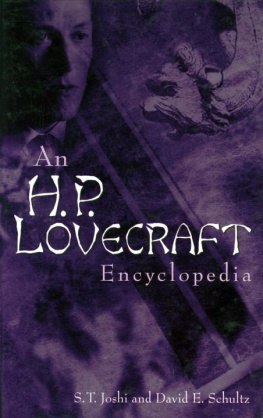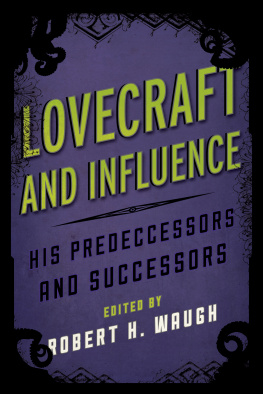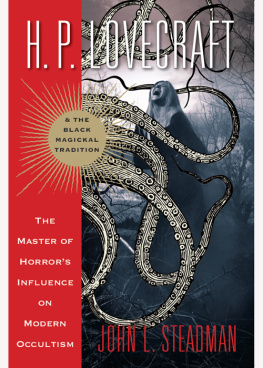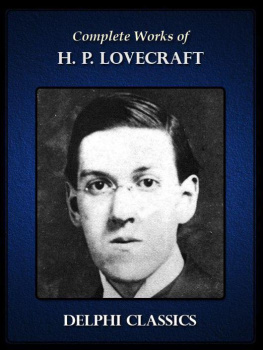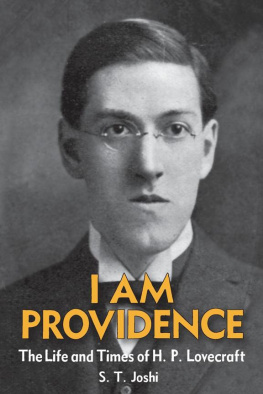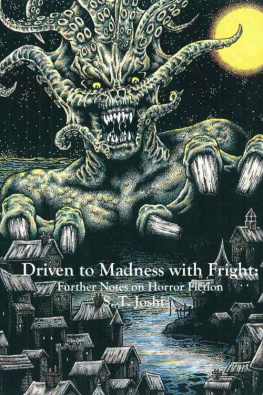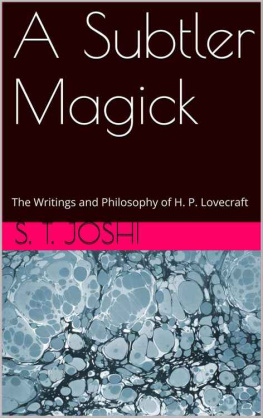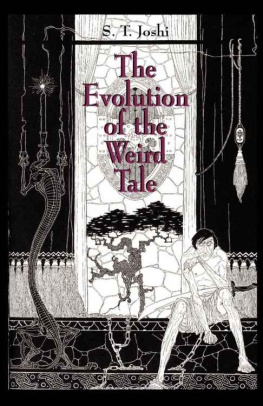Lovecraft and a World in Transition
THE HIPPOCAMPUS PRESS LIBRARY OF CRITICISM
S. T. Joshi, Primal Sources: Essays on H. P. Lovecraft (2003)
S. T. Joshi, The Evolution of the Weird Tale (2004)
Robert H. Waugh, The Monster in the Mirror: Looking for H. P. Lovecraft (2006)
Scott Connors, ed., The Freedom of Fantastic Things: Selected Criticism on Clark Ashton Smith (2006)
Ben Szumskyj, ed., Two-Gun Bob: A Centennial Study of Robert E. Howard (2006)
S. T. Joshi and Rosemary Pardoe, ed.,Warnings to the Curious: A Sheaf of Criticism on M. R. James (2007)
S. T. Joshi, Classics and Contemporaries: Some Notes on Horror Fiction (2009)
Kenneth W. Faig, Jr., The Unknown Lovecraft (2009)
Massimo Berruti, Dim-Remembered Stories: A Critical Study of R. H. Barlow (2010)
Gary William Crawford, Jim Rockhill, and Brian J. Showers, ed., Reflections in a Glass Darkly: Essays on J. Sheridan Le Fanu (2011)
Robert H. Waugh, A Monster of Voices: Speaking for H. P. Lovecraft (2011)
Donald Sidney-Fryer, The Golden State Phantasticks: The California Romantics and Related Subjects (2012)
William F. Nolan, Nolan on Bradbury: Sixty Years of Writing about the Master of Science Fiction (2013)
Steven J. Mariconda, H. P. Lovecraft: Art, Artifact, and Reality (2013)
S. T. Joshi, Unutterable Horror: A History of Supernatural Fiction (2014)
Massimo Berruti, S. T. Joshi, and Sam Gafford, ed., William Hope Hodgson: Voices from the Borderland (2014)
Lovecraft Annual (2007)
Dead Reckonings (2007)
LOVECRAFT AND A WORLD IN TRANSITION
Collected Essays on H. P. Lovecraft
S. T. Joshi
Hippocampus Press
New York
Copyright 2014 Hippocampus Press
Works by S. T. Joshi 2014 by S. T. Joshi
Published by Hippocampus Press
P.O. Box 641, New York, NY 10156.
http://www.hippocampuspress.com
All rights reserved.
No part of this work may be reproduced in any form or by any means
without the written permission of the publisher.
Cover photograph of H. P. Lovecraft courtesy of Dan Lorraine. A cropped version of this image appeared with The Phenomenon of HPL by Helen V. Wesson in the Fossil, 55, No. 154 (July 1957). The photograph is published here for the first time, with the entire image intact.
Cover design by Jessica Forsythe.
Hippocampus Press logo designed by Anastasia Damianakos.
First Ebook Edition
ISBN: 978-1-61498-103-9 (Kindle)
ISBN: 978-1-61498-104-6 (EPUB)
Contents
Introduction
There is a certain posthumous feeling to this volume, but the plain fact of the matter is that I am not likely to write many more critical essays on Lovecraft of the sort contained here, so it struck me as useful to gather my widely scattered essays for whatever value they may have.
It will be noted that the essays range from as early as 1978 (when I was twenty) to 2009. Read chronologically, they would perhaps reveal some facts about their authors intellectual development, if that were of any interest to anyone. Since it is clearly not, I have decided upon a broadly thematic arrangement that collects essays of approximately the same general subject, even at the risk of a certain amount of repetition. I have resisted the temptation to revise the essays significantly, although I have updated most of the citations.
It should be evident from my overall work on Lovecraftwhich includes such book-length works as H. P. Lovecraft: The Decline of the West (1990), H. P. Lovecraft: A Life (1996; revised as I Am Providence: The Life and Times of H. P. Lovecraft [2010]) and The Rise and Fall of the Cthulhu Mythos (2008)that my general concerns with Lovecraft focus on (a) the critical analysis of his work; (b) the philosophical thought that underlies much of his writing; (c) other bodies of work (essays, poetry, letters) aside from the fiction that tends to garner most of the attention among readers and critics; (d) the facts of his biography and the relation of his life to his work; and (e) his influence upon subsequent writers. The six section divisions of this book reflect these interests.
I began my study of Lovecraft as early as 1975, when, as an eager teenager just about to enter my senior year of high school, I embarked upon the grandiose plan of assembling an anthology of Lovecraft criticismthe volume that eventually became H. P. Lovecraft: Four Decades of Criticism (1980). It was around that time that I came into contact with many of the leading scholars and critics of that periodDirk W. Mosig, R. Alain Everts, David E. Schultz, J. Vernon Shea, and others. Mosig in particular guided my understanding of Lovecraft for at least the next three years, and I gained considerable benefit from my association with Schultz, Donald R. Burleson, Peter Cannon, Marc A. Michaud, Will Murray, anda bit laterRobert M. Price and Steven J. Mariconda. My entry into Brown University in 1976 materially aided my work, by allowing me constant access to Lovecrafts papers and manuscripts and to a wondrous array of writings by and about him.
My focus at that time, aside from the Four Decades, was the compilation of a bibliography of Lovecraft (published by Kent State University Press in 1981); but I also embarked tentatively on critical and philosophical analysis, the first results of which were the early essays Autobiography in Lovecraft and Reality and Knowledge. With Mosigs abrupt departure from the field around 1978, Burleson, Schultz, I, and others were forced to take over the reins of Lovecraft scholarship. I contributed a short monograph on Lovecraft to the Starmont Readers Guides series in 1982; Burleson wrote H. P. Lovecraft: A Critical Study (1983); Peter Cannon eventually wrote a fine monograph for Twaynes United States Authors Series (1989). My establishment of Lovecraft Studies (1979f.) helped foster much scholarship, as did other publications by Michauds Necronomicon Press.
As the centennial of Lovecrafts life approached in 1990, I felt the need to undertake a more ambitious philosophical study of Lovecraft, so I wrote H. P. Lovecraft: The Decline of the West. This was one of several books that appeared around this time, all centred around the H. P. Lovecraft Centennial Conference at Brown University (August 1719, 1990). By this time I had written the bulk of the essays in this book; several of those that date to the 1990s were in fact introductions to editions of works by or about Lovecraft.
Much as I had sought to evade it, the task of writing a new biography to supersede L. Sprague de Camps Lovecraft: A Biography (1975) seemed to fall to me, so I wrote the book in 199395. It was unable to find a haven with a commercial or academic publisher, and Necronomicon Press did me the great favour of issuing it in 1996; but it had to appear abridged (about one-third of the text had to be omitted). Nevertheless, the book was on the whole well received. It also signalled, perhaps understandably, the effective end of my critical/philosophical/biographical work on Lovecraft. I had pretty much said all that I wished to say, and felt it was time to leave it to others to contribute work of a different sort or work that probed the issues I myself had treated in a more searching way. This work has happily been done by such scholars as Robert H. Waugh, J.-M. Rajala, Gavin Callaghan, and others. Even the demise of



